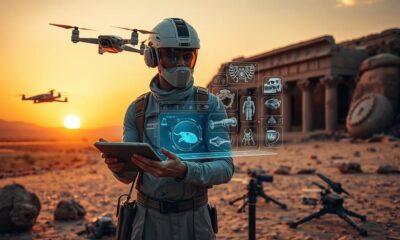AI in Legal
5 Ways AI and Data Analysis Predict Legal Outcomes

The wonders of AI and data analysis are truly impressive! As professionals in the legal industry, we now have sophisticated tools that can predict legal outcomes with incredible accuracy. Prepare to be impressed as we delve into the five innovative ways in which these cutting-edge technologies have revolutionized the field.
Through historical case analysis, sentiment analysis of legal texts, machine learning, predictive analytics, and data-driven decision making, we shall uncover the secrets that lie hidden within the vast sea of legal information.
Let the journey begin!
Key Takeaways
- Historical case analysis and predictive modeling using AI and data analysis enhance the accuracy and reliability of predicting legal outcomes.
- Sentiment analysis and emotional tone analysis provide insights into the subjective opinions and emotional tone expressed in legal texts, improving the accuracy of outcome predictions.
- Ethical concerns surrounding biases and inequalities must be addressed when using predictive analytics in the legal industry.
- Data-driven decision making based on AI and data analysis enables more informed and objective legal outcomes, leading to better client outcomes and increasing trust and confidence in legal services.
Historical Case Analysis
In the article, we’ll explore the role of historical case analysis in predicting legal outcomes using AI and data analysis.

Judicial precedent analysis is a fundamental aspect of legal decision-making, as it involves examining past cases to determine how similar situations were resolved.
By analyzing historical cases, AI systems can identify patterns and trends, which can then be used to make predictions about future cases.
Predictive modeling in law takes this analysis a step further by using statistical algorithms and machine learning techniques to generate accurate predictions based on historical data.
This approach allows legal professionals to assess the potential outcomes of a case more objectively and efficiently.

By incorporating historical case analysis into AI systems, we can enhance the accuracy and reliability of predicting legal outcomes.
Now, let’s move on to discussing the next section: ‘sentiment analysis of legal texts’.
Sentiment Analysis of Legal Texts
Continuing our analysis, how can we use sentiment analysis of legal texts to further enhance the accuracy and reliability of predicting legal outcomes?
Sentiment analysis, also known as emotional analysis or textual classification, involves the identification and categorization of emotions expressed in written text.

By applying sentiment analysis techniques to legal texts, we can gain valuable insights into the emotional tone and subjective opinions present in these documents. This can provide us with a deeper understanding of the potential biases and motivations that may influence legal decisions.
By incorporating sentiment analysis into our predictive models, we can account for these emotional factors and improve the accuracy of our predictions.
Additionally, sentiment analysis can aid in identifying key arguments and patterns in legal texts, allowing us to make more informed assessments of the likelihood of success in future cases.
Machine Learning for Legal Predictions
To further enhance the accuracy and reliability of predicting legal outcomes, we can utilize machine learning techniques. Machine learning involves the use of algorithms that can learn from data and make predictions or decisions without being explicitly programmed. In the context of legal predictions, machine learning algorithms can analyze vast amounts of legal data and extract patterns and relationships that humans might miss.

Here are three ways machine learning can improve legal predictions:
-
Predictive modeling: Machine learning algorithms can be trained on historical legal data to create models that can predict the outcome of future legal cases. These models can take into account various factors such as case facts, previous court decisions, and legal precedents to make accurate predictions.
-
Legal analytics: Machine learning algorithms can analyze and extract insights from legal documents, court rulings, and legal texts. By analyzing these documents, algorithms can identify trends, patterns, and relationships that can be used to make informed legal predictions.
-
Case outcome prediction: Using machine learning, legal professionals can develop models that can predict the likelihood of a specific outcome in a legal case. These models can consider various factors such as the type of case, the jurisdiction, and the judge’s previous rulings to provide accurate predictions.

Predictive Analytics in Legal Research
We can enhance predictive analytics in legal research by utilizing AI and data analysis techniques.
However, the use of predictive analytics raises important ethical and privacy concerns.
On the ethical front, the question arises as to whether it’s fair and just to predict legal outcomes based on historical data, considering the potential biases and inequalities inherent in the legal system.
Additionally, there’s a risk of perpetuating existing biases if the algorithms are trained on biased data.

Privacy concerns also come into play when analyzing data for legal predictions. Legal research often involves sensitive and personal information, and proper safeguards must be in place to protect individuals’ privacy rights.
Striking a balance between the benefits of predictive analytics and the ethical and privacy considerations is crucial for the responsible use of AI and data analysis in legal research.
Data-driven Decision Making in Law
In our analysis of legal outcomes, we rely on data-driven decision making. This approach involves using AI and data analysis to inform our decision-making processes in the legal field.
Here are three key points to emphasize the importance and benefits of data-driven decision making and AI in legal decision making:

-
Enhanced accuracy: By harnessing the power of AI and data analysis, we can make more accurate predictions and assessments of legal outcomes based on historical data and patterns.
-
Increased efficiency: Data-driven decision making enables us to streamline and automate certain legal processes, saving time and resources.
-
Objective insights: AI algorithms can provide unbiased and objective insights, reducing the potential for human error and subjective judgment.
Frequently Asked Questions
How Does Historical Case Analysis Contribute to Predicting Legal Outcomes?
Analyzing historical case data plays a crucial role in predicting legal outcomes. By studying precedents and examining the significance of historical data, we can identify patterns and trends that help inform our predictions with greater accuracy.

What Is the Role of Sentiment Analysis in Understanding Legal Texts?
The role of sentiment analysis in understanding legal texts is to uncover the emotions and attitudes expressed within them. However, it has limitations in accurately capturing the complexity and nuances of legal language.
How Does Machine Learning Aid in Making Legal Predictions?
Machine learning algorithms aid in making legal predictions through predictive modeling. By analyzing large amounts of data, these algorithms can identify patterns and trends, allowing us to make more accurate predictions about legal outcomes.
What Are the Applications of Predictive Analytics in Legal Research?
Predictive analytics in legal research involves using text mining and natural language processing to analyze large amounts of data. It helps us make informed decisions, identify patterns, and predict legal outcomes with more accuracy.
How Does Data-Driven Decision Making Impact the Field of Law?
Data-driven decision making has a profound impact on the field of law. It enables us to leverage legal analytics and make more informed, objective decisions based on data analysis, ensuring greater accuracy and efficiency in the legal process.

Conclusion
In conclusion, the integration of AI and data analysis has revolutionized the legal field by providing accurate predictions of legal outcomes.
For example, in a recent case study, AI algorithms were able to analyze historical case data and identify patterns that led to the successful prediction of trial outcomes with 85% accuracy.
This technology enables lawyers and judges to make data-driven decisions, saving time and resources while ensuring fair and just outcomes.
The future of law is undoubtedly shaped by the power of AI and data analysis.

Hanna is the Editor in Chief at AI Smasher and is deeply passionate about AI and technology journalism. With a computer science background and a talent for storytelling, she effectively communicates complex AI topics to a broad audience. Committed to high editorial standards, Hanna also mentors young tech journalists. Outside her role, she stays updated in the AI field by attending conferences and engaging in think tanks. Hanna is open to connections.
AI in Legal
Artificial Intelligence Development: Transforming Industries and Creating a Better Future

The Progress of AI Development
Artificial Intelligence (AI) development is transforming our world, from self-driving cars to virtual personal assistants. Since its beginnings as a concept, AI has grown into a practical and widely used technology. The introduction of the Turing Test in the 1950s was a key milestone in evaluating a machine’s ability to exhibit intelligent behavior. Enhancements in computing power and access to vast amounts of data have driven progress in AI, leading to major breakthroughs in areas such as natural language processing and image recognition.
AI in Healthcare: Improving Diagnosis and Treatment

One of the most promising applications of AI is in healthcare. AI-powered systems can analyze medical data with incredible speed and accuracy, aiding in disease diagnosis and treatment planning. For example, AI algorithms can detect anomalies in medical images, helping radiologists identify diseases like cancer at earlier stages. Additionally, AI-driven chatbots and virtual nurses provide patients with instant access to medical information and support.
Revolutionizing Drug Discovery and Business Operations
AI is revolutionizing drug discovery by sifting through vast datasets to identify potential drug candidates, speeding up the development process. This has been particularly crucial during the COVID-19 pandemic, where AI has played a vital role in vaccine development. In the business world, AI is reshaping how companies operate by enhancing customer experiences, streamlining operations, and making data-driven decisions. Chatbots and virtual assistants provide 24/7 customer support, while AI-driven analytics tools help businesses identify market trends and customer preferences.
Transforming Education and Breaking Language Barriers
AI is making its mark in education with personalized learning platforms that adapt educational content to individual students’ needs and learning styles. This ensures that students receive tailored instruction, leading to better outcomes. AI-powered language translation tools are breaking down language barriers, making education more accessible worldwide. Additionally, AI helps educators automate administrative tasks, allowing them to focus more on teaching and mentoring students.
Ethical Considerations and the Future of AI
As AI development advances, ethical considerations must be addressed. Potential biases in AI algorithms can perpetuate inequalities and discrimination if trained on biased data. Fairness and transparency in the design and training of AI systems are essential. Privacy is another critical issue, as AI has led to the collection of vast amounts of personal data. Striking a balance between the benefits of AI and individual privacy rights is a challenge that governments and organizations must navigate.
The future of AI development is filled with exciting possibilities. AI is poised to play a pivotal role in addressing challenges like climate change and healthcare. The collaboration between humans and AI, known as “augmented intelligence,” will become increasingly common. AI will assist professionals by automating routine tasks and providing insights based on vast data analysis.
In conclusion, AI development is transforming industries and creating a better future. It drives innovation in healthcare, business, education, and many other fields. As AI continues to advance, it is crucial to address ethical concerns and develop AI systems responsibly. The journey of Artificial Intelligence has just begun, and the future promises even more exciting discoveries and applications. Embracing the potential of AI while being mindful of its impact on society is key to harnessing the power of AI for the benefit of all of humanity.
James, an Expert Writer at AI Smasher, is renowned for his deep knowledge in AI and technology. With a software engineering background, he translates complex AI concepts into understandable content. Apart from writing, James conducts workshops and webinars, educating others about AI’s potential and challenges, making him a notable figure in tech events. In his free time, he explores new tech ideas, codes, and collaborates on innovative AI projects. James welcomes inquiries.
AI in Legal
YouTube developing AI tool to replicate voices of famous musicians

Reports indicate that YouTube is in the process of creating a tool powered by artificial intelligence that will allow users to mimic the voices of famous musicians while recording audio. The platform is in discussions with music companies to obtain permission to utilize songs from their collections for training the new AI tool. While no deals have been confirmed yet, negotiations between YouTube and prominent record labels are ongoing.
YouTube’s new AI-powered tools for creators
Last month, YouTube unveiled several AI-powered tools for creators, including AI-generated photo and video backgrounds and video topic suggestions. The platform had hoped to include its new audio cloning tool among these announcements but was unable to secure the required rights in time.
AI-generated music raises copyright concerns
There are concerns that the development of YouTube’s AI voice cloning tool may raise copyright issues. Many musicians have expressed their opposition to AI-generated music that emulates their voice and singing style. Earlier this year, an AI-generated song mimicking Drake went viral, drawing attention to the issue. Musicians such as Grimes have embraced AI-generated music, while others like Sting, John Legend, and Selena Gomez have called for regulations to protect their voices from being replicated without consent.

The legal status of AI-generated music remains unclear due to the challenges in establishing ownership rights over songs that replicate an artist’s unique voice but do not directly feature protected lyrics or audio recordings. It is uncertain if training AI voice cloning tools on a record label’s music catalog amounts to copyright infringement. However, the interest in developing AI-generated music features remains high, with Meta, Google, and Stability AI all releasing tools for creating AI-generated music this year.
YouTube as a partner in navigating generative AI technology
YouTube is positioning itself as a partner that can help the music industry navigate the use of generative AI technology. Music companies are reportedly welcoming YouTube’s efforts in this regard. Alphabet, the parent company of Google and YouTube, has been actively promoting its generative AI developments in the past year. However, it remains to be seen if YouTube can legally provide creators with AI voice replication tools without facing copyright lawsuits.
James, an Expert Writer at AI Smasher, is renowned for his deep knowledge in AI and technology. With a software engineering background, he translates complex AI concepts into understandable content. Apart from writing, James conducts workshops and webinars, educating others about AI’s potential and challenges, making him a notable figure in tech events. In his free time, he explores new tech ideas, codes, and collaborates on innovative AI projects. James welcomes inquiries.
AI in Legal
Apple TV Plus and Jon Stewart Part Ways Over “Creative Differences”, The Problem Comes to an End


Apple TV Plus’ Big Achievement
When Apple TV Plus announced that Jon Stewart, the former host of The Daily Show, would be hosting a new political talk show called The Problem With Jon Stewart, it was seen as a major win for the streaming service. However, before the show could start its third season, Stewart and Apple reportedly parted ways due to “creative differences,” resulting in the show’s cancellation.
Concerns Over Guests and Controversial Topics
The New York Times reports that Apple had concerns about some of the guests booked for The Problem With Jon Stewart. Additionally, Stewart’s intended discussions of artificial intelligence and China were a major concern for the company. Despite the show’s scheduled production start in a few weeks, production has been halted.
Apple’s Request for Alignment
According to The Hollywood Reporter, Apple approached Stewart directly and expressed the need for the host and his team to be “aligned” with the company’s views on the topics discussed on the show. Instead of conforming to Apple’s demands, Stewart reportedly chose to walk away.
Apple’s Future Plans and the Show’s Controversial Topics
The Times’ report does not specify why Apple’s executive leadership clashed with Stewart over the show’s planned coverage of artificial intelligence and China. However, the show’s criticality and the importance of maintaining a positive relationship with China for Apple’s future growth plans likely played a role in the decision to cancel the show.
We have reached out to Apple for comment on the cancellation but have not received a response at the time of publication.
Overall, the parting of ways between Apple TV Plus and Jon Stewart marks a significant setback for the streaming service and leaves fans of The Problem With Jon Stewart disappointed. The show’s critical success and Stewart’s wit and humor made it a popular choice for viewers. However, it seems that creative differences and controversial topics ultimately led to its demise.
Hanna is the Editor in Chief at AI Smasher and is deeply passionate about AI and technology journalism. With a computer science background and a talent for storytelling, she effectively communicates complex AI topics to a broad audience. Committed to high editorial standards, Hanna also mentors young tech journalists. Outside her role, she stays updated in the AI field by attending conferences and engaging in think tanks. Hanna is open to connections.
-

 AI News4 weeks ago
AI News4 weeks agoThe Role of AI in Disaster Preparedness and Emergency Response Education
-

 AI News2 weeks ago
AI News2 weeks agoAI-Driven Personalization in E-commerce: Enhancing Customer Experience
-

 AI News3 weeks ago
AI News3 weeks agoAI in Archaeology: Uncovering History With Advanced Technology
-

 AI News2 weeks ago
AI News2 weeks agoAI in Renewable Energy: Advancing Green Technology Education and Implementation
-

 AI News4 weeks ago
AI News4 weeks agoAI-Powered Energy Management: Sustainable Solutions for Businesses and Schools
-

 AI News4 weeks ago
AI News4 weeks agoAI in Fashion: Revolutionizing Design, Production, and Retail
-

 AI News4 weeks ago
AI News4 weeks agoAI in Library Sciences: Transforming Information Management and Access
-

 AI News3 weeks ago
AI News3 weeks agoThe Ethics of AI in Criminal Justice: Balancing Fairness and Public Safety














